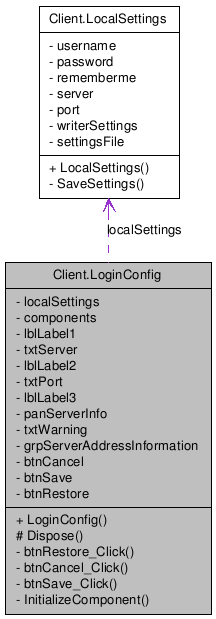
Collaboration diagram for Client.LoginConfig:

Public Member Functions | |
| LoginConfig (LocalSettings ls) | |
| The LoginConfig constructor. | |
Protected Member Functions | |
| override void | Dispose (bool disposing) |
| Clean up any resources being used. | |
Private Member Functions | |
| void | btnRestore_Click (object sender, EventArgs e) |
| Restores the option texts to their default values, but does not save them... | |
| void | btnCancel_Click (object sender, EventArgs e) |
| Simply close the form - we're not saving. | |
| void | btnSave_Click (object sender, EventArgs e) |
| Save the settings and close the form. | |
| void | InitializeComponent () |
| Required method for Designer support - do not modify the contents of this method with the code editor. | |
Private Attributes | |
| LocalSettings | localSettings |
| An instance of LocalSettings passed on from the caller, set by the constructor and used for saving configuration data before closing the form. | |
| System.ComponentModel.IContainer | components = null |
| Required designer variable. | |
| System.Windows.Forms.Label | lblLabel1 |
| System.Windows.Forms.TextBox | txtServer |
| System.Windows.Forms.Label | lblLabel2 |
| System.Windows.Forms.TextBox | txtPort |
| System.Windows.Forms.Label | lblLabel3 |
| System.Windows.Forms.Panel | panServerInfo |
| System.Windows.Forms.TextBox | txtWarning |
| System.Windows.Forms.GroupBox | grpServerAddressInformation |
| System.Windows.Forms.Button | btnCancel |
| System.Windows.Forms.Button | btnSave |
| System.Windows.Forms.Button | btnRestore |
Definition at line 14 of file LoginConfig.cs.
| Client.LoginConfig.LoginConfig | ( | LocalSettings | ls | ) |
The LoginConfig constructor.
| ls | LocalSettings instance, passed by reference |
Definition at line 26 of file LoginConfig.cs.
References Client.LoginConfig.InitializeComponent(), Client.LoginConfig.localSettings, Client.LocalSettings.Port, Client.LocalSettings.Server, Client.LoginConfig.txtPort, and Client.LoginConfig.txtServer.
Here is the call graph for this function:

| void Client.LoginConfig.btnRestore_Click | ( | object | sender, | |
| EventArgs | e | |||
| ) | [private] |
Restores the option texts to their default values, but does not save them...
| sender | Who is calling? | |
| e | What arguments do they give us? |
Definition at line 40 of file LoginConfig.cs.
References Client.LoginConfig.txtPort, and Client.LoginConfig.txtServer.
Referenced by Client.LoginConfig.InitializeComponent().
Here is the caller graph for this function:

| void Client.LoginConfig.btnCancel_Click | ( | object | sender, | |
| EventArgs | e | |||
| ) | [private] |
Simply close the form - we're not saving.
| sender | Who is calling? | |
| e | What arguments do they give us? |
Definition at line 51 of file LoginConfig.cs.
Referenced by Client.LoginConfig.InitializeComponent().
Here is the caller graph for this function:

| void Client.LoginConfig.btnSave_Click | ( | object | sender, | |
| EventArgs | e | |||
| ) | [private] |
Save the settings and close the form.
| sender | Who is calling? | |
| e | What arguments do they give us? |
Definition at line 61 of file LoginConfig.cs.
References Client.LoginConfig.localSettings, Client.LocalSettings.Port, Client.LocalSettings.Server, Client.LoginConfig.txtPort, and Client.LoginConfig.txtServer.
Referenced by Client.LoginConfig.InitializeComponent().
Here is the caller graph for this function:

| override void Client.LoginConfig.Dispose | ( | bool | disposing | ) | [protected] |
Clean up any resources being used.
| disposing | true if managed resources should be disposed; otherwise, false. |
Definition at line 14 of file LoginConfig.Designer.cs.
References Client.LoginConfig.components.
| void Client.LoginConfig.InitializeComponent | ( | ) | [private] |
Required method for Designer support - do not modify the contents of this method with the code editor.
Definition at line 29 of file LoginConfig.Designer.cs.
References Client.LoginConfig.btnCancel, Client.LoginConfig.btnCancel_Click(), Client.LoginConfig.btnRestore, Client.LoginConfig.btnRestore_Click(), Client.LoginConfig.btnSave, Client.LoginConfig.btnSave_Click(), Client.LoginConfig.grpServerAddressInformation, Client.LoginConfig.lblLabel1, Client.LoginConfig.lblLabel2, Client.LoginConfig.lblLabel3, Client.LoginConfig.panServerInfo, Client.LoginConfig.txtPort, Client.LoginConfig.txtServer, and Client.LoginConfig.txtWarning.
Referenced by Client.LoginConfig.LoginConfig().
Here is the call graph for this function:

Here is the caller graph for this function:

An instance of LocalSettings passed on from the caller, set by the constructor and used for saving configuration data before closing the form.
Definition at line 20 of file LoginConfig.cs.
Referenced by Client.LoginConfig.btnSave_Click(), and Client.LoginConfig.LoginConfig().
System.ComponentModel.IContainer Client.LoginConfig.components = null [private] |
Required designer variable.
Definition at line 8 of file LoginConfig.Designer.cs.
Referenced by Client.LoginConfig.Dispose().
 1.5.1-p1
1.5.1-p1